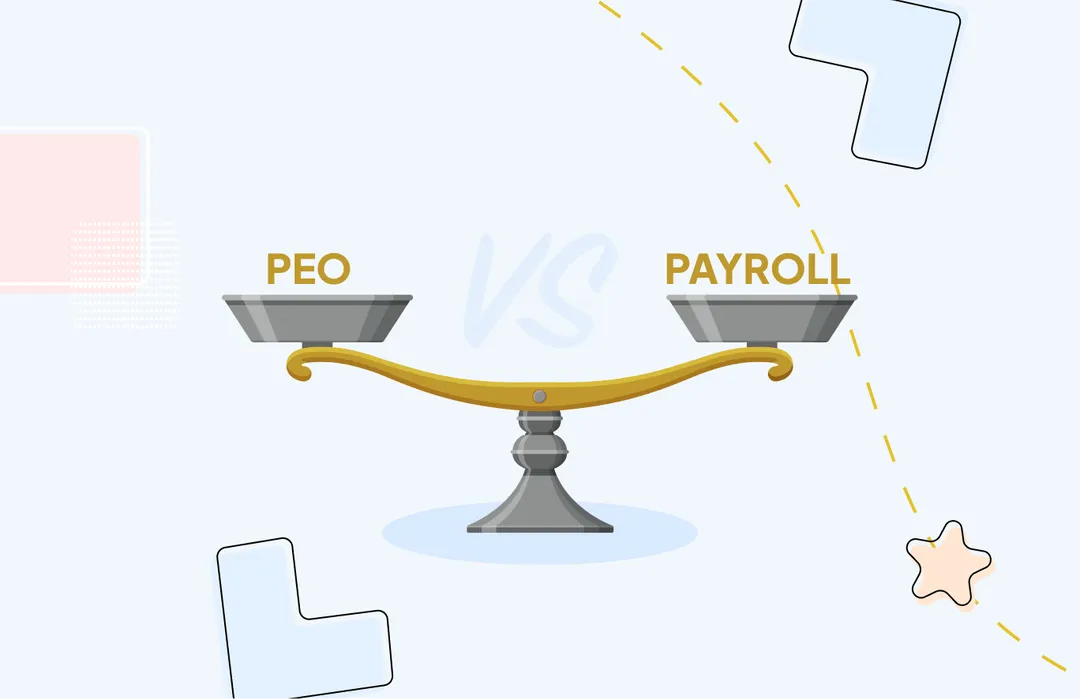PEO vs. Payroll Services – Which suits your business goals?

Discover the ultimate guide to selecting the perfect Employer of Record (EOR) platform for your business. Equip yourself with the knowledge needed to make an informed decision and ensure smooth international hiring and workforce management.

We're entering an era where Professional Employer Organizations (PEOs) and Payroll Services are rewriting the rules of HR management. With expert guidance, simplified administrative tasks, incredible cost savings, and 100% compliance, these solutions are now freeing businesses from the shackles of tedious HR processes so they can focus on driving their organizations forward. If you still need to start using a PEO or a Payroll service, this blog discusses their relative benefits so you can make the right call for your business.
What is a Professional Employer Organization?
Imagine having a dedicated team of HR professionals that handles all aspects of employee management on your behalf. With a PEO, you can outsource essential HR functions such as payroll administration, benefits management, employee onboarding, and compliance. Essentially, the PEO becomes your co-employer, sharing employer responsibilities with you. This partnership frees up your valuable time and ensures that these critical HR tasks are handled efficiently and in compliance with the ever-changing regulatory landscape.
For instance, Gloroots provides Employer of Record (EOR) services as part of PEO services. The platform takes on the legal and administrative responsibilities by being your workforce’s official employer. PEOs handle payroll, taxes, workers' compensation, and other employment-related matters. You retain control and direction over your employees' day-to-day activities while they ensure compliance and mitigate employment risks. This arrangement benefits companies expanding into new markets or hiring remote workers.
Here's what a PEO can handle on behalf of your organization:
- Co-Employment Agreement: The PEO and the client company enter a co-employment agreement. This agreement outlines the division of employer responsibilities between the two parties.
- Employee Leasing: The client company's employees are leased or assigned to the PEO. This means that the PEO becomes the employer of record for payroll and tax purposes. However, the client company controls day-to-day operations, including job duties and supervision.
- HR Management: The PEO assumes various HR responsibilities, such as payroll administration, tax withholding, benefits administration, workers' compensation, and compliance with employment laws and regulations. The PEO typically has the expertise and resources to manage these functions effectively.
- Employee Benefits: PEOs often provide access to comprehensive localized employee benefits packages, such as health insurance, retirement plans, and other perks. Since PEOs typically work with multiple client companies, they can leverage their collective size to offer more competitive benefits options.
- Risk Management: PEOs help manage risks associated with HR and employment-related issues. They may guide workplace safety, employee training, and compliance with labor laws. PEOs aim to minimize potential risks and liabilities for client companies by sharing employer responsibilities.
- Cost Savings: PEOs can provide cost savings to client companies. PEOs can negotiate better rates for employee benefits, insurance, and other HR-related services by pooling multiple companies' employees. Additionally, outsourcing HR functions to a PEO can save time and resources for the client company.
What is a Payroll Service Provider (PSP)?
Payroll Services providers offer specialized expertise and technology to handle your payroll processing, tax filings, and related compliance matters. Outsourcing payroll to a trusted service provider reduces operational overhead by saving time, reducing errors, and ensuring your employees are paid correctly and promptly.
For instance, consider a manufacturing company with a large workforce. They decide to partner with a Payroll Services provider. The provider manages payroll by calculating wages, deducting taxes, and generating pay stubs. This relieves the company's HR team from the burden of complex payroll calculations and compliance obligations, allowing them to focus on other critical HR initiatives like recruitment, employee engagement and talent development.
Here’s how PSPs work:
- Information Collection: The employer (client) provides the necessary employee and payroll data to the PSP. This includes employee hours worked, salaries, wage rates, deductions, and other relevant information.
- Payroll Processing: The PSP takes this information and processes the payroll for the client company. They calculate wages, deductions, taxes, and other payroll-related components based on the data provided. They ensure that the payroll calculations comply with applicable employment laws and regulations.
- Paycheck Generation: The PSP generates employee paychecks or direct deposit files once the payroll is processed. The paychecks typically include gross pay, net pay, taxes withheld, and any deductions or additions specified by the employee (e.g., benefits contributions).
- Tax Management: The PSP handles the calculation and withholding of payroll taxes on behalf of the client company. They ensure that the correct amount of federal, state, and local taxes are withheld from employee paychecks. The PSP may also assist with preparing and filing payroll tax returns to the appropriate tax authorities.
- Reporting and Compliance: The PSP generates payroll reports for the client company, including employee earnings summaries, tax summaries, and other required info. They help ensure compliance with payroll-related regulations, such as providing required documentation for audits or government inquiries.
- Benefits Administration: Some PSPs also offer benefits administration services. They help manage employee benefits programs like health insurance, retirement plans, and flexible spending accounts. The PSP handles the necessary deductions and reporting related to these benefits.
- Direct Communication: PSPs maintain communication with the client company’s employees throughout the process. They address any payroll-related questions or concerns and assist with employee payroll-related inquiries. PSP Clients’ HR teams do not spend time answering repetitive employee questions.
What is the difference between PEOs and PSPs?
Note that specific offerings and features may vary depending on the service provider and the agreement reached with the PEO. When choosing between a Payroll Service Provider and a PEO, it is crucial to assess your company's unique requirements, budget, level of HR expertise, the desired degree of control, and the extent of compliance support needed. Overall, both options offer advantages and can significantly streamline HR operations. Consulting with an HR specialist or advisor can provide further insights to help you make an informed decision based on your organization's needs.
How to choose between Standard Payroll Service & PEO Payroll Service?
Choosing a Standard Payroll Service and a PEO Payroll Service depends on your business's needs, size, growth plans, and budget. To help you evaluate whether a Standard Payroll Service or a PEO Payroll Service would suit your business better, let's consider some real-life scenarios:
Scenario 1: Small Business with Basic Payroll Needs
A Standard Payroll Service might be sufficient if you only plan on hiring a small number of overseas employees. In such cases, employers may not need to setup local entities, which entails significant capital expenditure, management involvement and compliance risk. Moreover hiring a limited number of overseas employees means the administrative overhead can be managed internally. This service will focus primarily on processing payroll, calculating taxes, and generating paychecks. It is cost-effective and allows you to retain complete control over HR-related decisions and employee management.
Scenario 2: Growing Business with Expanding HR Needs
Suppose your business is experiencing growth, and you anticipate high levels of overseas hiring. In this scenario, benefits administration, compliance management, and HR consulting can become expensive and time-consuming. A PEO Payroll Service could reduce costs and time spent. PEOs offer comprehensive HR outsourcing, including payroll services. They can assist with a broader range of HR functions, allowing you to focus on scaling your business while relying on their HR expertise and support.
Scenario 3: Complex HR Requirements and Risk Mitigation
A PEO Payroll Service may be advantageous if your business operates in a highly regulated industry with complex HR requirements, such as specific compliance standards, workers' compensation, or employee training. PEOs specialize in managing HR complexities and can help mitigate risks associated with HR-related issues. They guide compliance matters and workplace safety and offer access to a broader range of employee benefits.
Scenario 4: Cost Considerations and Scalability
Consider your budget and scalability needs. Standard Payroll Services often have straightforward pricing structures, typically charging based on the number of employees or payrolls processed. On the other hand, PEOs generally charge a percentage of overall payroll costs or may have a per-employee fee structure. A Standard Payroll Service may be more suitable if cost predictability is essential and you expect rapid growth. However, it may be worthwhile if you value PEO's scalability and bundled HR services.
It's essential to assess your HR requirements, compliance obligations, and desire for additional HR support before choosing. Consulting with global payroll and compliance experts can provide further guidance tailored to your unique circumstances.
Choose Gloroots as your PEO
Ready to level up your HR and payroll management? It's decision time: PEO or PSP? Let's make it simple.
Gloroots, as your PEO partner, has got your back against legal headwinds. You can expect smooth global hiring experiences with minimal effort.
Delightful employee experiences? Check. Compliance wizards? Check. Go global with confidence, thanks to our reliable infrastructure. Streamline your global ops effortlessly with our integrated HRMS. Oh, and your intellectual property? Fully protected.
With Gloroots as your ultimate PEO partner, be assured that your payroll management, onboarding, and, most importantly, legal compliances are taken care of.
To learn more, contact us today!



.webp)

.webp)
.webp)




